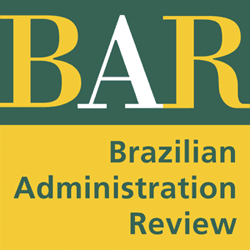EDITORIAL
Greetings! This fourth issue of the Brazilian Administration Review this year comes out just as we reinforce our Editorial Board with a "Brazilian International Heavy Weight". Professor Sergio Giovanetti Lazzarini will fit extremely well in our council with his expertise in formal and informal governance of interorganizational relations. The continuous renewal of the Editorial Board assures a necessary breath of fresh air for our editorial processes.
In this issue, as usual, six articles are made available. To begin with The Internationalization Process of Brazilian Companies: a Study of Multiple Cases in the Heavy Construction Industry, in which Flavia Luciane Scherer, Clandia Maffini Gomes and Isak Kruglianskas discuss how the consolidation in the international markets of Brazilian construction companies occurred. The authors conducted this study on four companies: Andrade Gutierrez, Mendes Júnior, Norberto Odebrecht and Queiroz Galvão. A theoretical model with four analytical levels was considered: the macro context, the institutional environment, the industry and the firm. The results indicate that consolidation in international markets occurred largely as a result of factors concerning strategic management in response to the institutional processes and the appropriateness of the sector's competitive conditions.
Institutional processes are also focused on in the second article, Organizational Institutionalism in the Academic Field in Brazil: Social Dynamics and Networks, where Edson Ronaldo Guarido Filho, Clóvis L. Machado-da-Silva and Sandro Aparecido Gonçalves investigate how the construction of the institutional perspective is delineated in the context of organizational studies in Brazil from 1993 to 2007. The study is based on research of articles published in journals and academic meetings analyzing social networks and bibliometric indicators to map the cooperation relationships between researchers, based upon the cited authors. "The findings reveal that the expansion of the field is based on the growing elaboration of a social organization with close links to the activities of continuant and transient researchers".
In the third text, Sales Managers' Performance and Social Capital: the Impact of an Advice Network, Danny Pimentel Claro and Sílvio Abrahão Laban Neto show us another interesting study of social networks. This time, the research is about sales managers. Considering the results obtained and the discussion provided in the hypotheses presentation, the authors "argue that sales managers must have accurate perceptions of their network". Two different networks were analyzed: friendship and advice; considering different views of network structure and claiming to make an impact on performance. Danny and Sílvio examined whether sales managers, in order to improve sales performance, develop either a highly cohesive network or one containing structural holes. Census data was collected from over 500 personnel of an agricultural input retailer with 23 divisions.
In the next paper, entitled Proposal of a Validation Framework for a New Measurement Model and its Application to the Export Performance Construct, Jorge Carneiro, Angela da Rocha and Jorge Ferreira da Silva present and analyze a comprehensive set of validation procedures to assess the satisfactoriness of measurement models of multifaceted constructs. The validation framework is applied to a new measurement model of the economic domain of export performance, "a construct for which agreement has not yet been reached in the literature concerning the appropriate representation of its complex nature. A sample of 414 large Brazilian exporters of manufactured products was collected, and five competing measurement models of the construct were proposed and comparatively assessed".
To follow, Ricardo Corrêa Gomes and Joyce Liddle present a text entitled The Balanced Scorecard as a Performance Management Tool for Third Sector Organizations: the Case of the Arthur Bernardes Foundation, Brazil in which they investigate Kaplan and Norton's suggestion that non-profit organizations should put customers at the top of their strategic maps, an interpretive paradigm using an action research strategy. Data were collected through focus groups and individual interviews and analyzed using interpretation and content analysis.
In the sixth and final paper, Luciana Marques Vieira and Tatiana Maia investigate Fair Trade [FT] certification as a way to include small producers in global value chains in their paper named The Governance of Fair Trade System: Evidence from Small Honey Producers in Rio Grande do Sul. This study is three-fold: first characterizing the FT system, then presenting governance by third party certifiers and, finally, providing empirical evidence of the main difficulties that small producers face in complying with FT.
I hope you all enjoy this edition.
Rogério H. Quintella
Chief Editor
Publication Dates
-
Publication in this collection
06 Nov 2009 -
Date of issue
Dec 2009

